- Home
- Stephen R. Donaldson
This Day all Gods Die: The Gap into Ruin Page 3
This Day all Gods Die: The Gap into Ruin Read online
Page 3
Mikka shifted positions; faced Ciro with her bandaged glower. Conflicts twisted her familiar scowl.
He tried to make it easier for her. “You’d better go.” Tension clutched at his throat: his voice sounded like a croak. “There isn’t anybody else. I’ll be all right.”
That was a lie. He knew he was never going to be all right again. But it didn’t matter. He couldn’t afford honesty.
“I hear you.” The shipwide intercom channel brought Vector’s voice to the cabin. He might have been shouting to make himself heard over the hull-roar. Or else all this g had brutalized his sore joints, and he shouted against his pain. “Tell me what you want. I’ll do it.”
“I can’t,” Mikka breathed through her teeth. “You’re in no condition—”
“Angus is outside!” Davies retorted. “He shouldn’t be alive. But he left his pickup open. I can hear him breathing.
“Put on a suit. Go get him—bring him in.”
“See?” Ciro told her. “There isn’t anybody else.” He spoke as if her predicament were as simple as his. “Vector has to rescue Angus. Morn can’t handle hard g. Sib is gone.” Even Nick was gone. Dimly Ciro remembered hearing someone—Davies? Morn?—tell Mikka that Nick and Sib had left the ship to attack Soar in EVA suits. “I’ll just rest until you come back.”
“I’m on my way,” Vector replied. Even when he shouted, he didn’t sound like a man who understood ruin.
With an inward convulsion, Mikka made her decision. “Do that,” she ordered bitterly. “Lock the door after me. Seal your g-sheath, don’t get out of bed.” In spite of her wounds and exhaustion, she was too strong to ignore Davies’ need—or Trumpet’s. “I won’t be gone long. Just until we get past whatever Davies is upset about.”
Just until Ciro did what he had to do in order to save his soul.
When Sorus Chatelaine captured the gap scout, she would give him back his humanity. His sanity—
The g of Trumpet’s acceleration canted the cabin steeply. Brandishing her glare like a fist, Mikka rolled out of the bunk, planted her feet, and climbed to the door. When she’d reached it and keyed it open, however, she turned toward him again.
“I mean it,” she insisted. “Don’t get out of bed. You’re safe here. As safe as it’s possible for any of us to be. That mutagen is gone. This isn’t something Vector could be wrong about. And you know him. You know he wouldn’t lie to you.”
She might have gone on. Pronouncing reassurances he couldn’t hear. He could tell she wanted to. But she must have seen that he was out of reach. Abruptly she clamped her mouth shut. The muscles at the corners of her jaw knotted dangerously as she left the cabin.
Left the cabin.
Left him alone.
She wouldn’t come back: he was sure of that. Not when Davies needed her so badly. I’m alone here. I can’t do this many jobs at once. Ciro trusted her implicitly, even though she’d nearly driven him crazy.
His heart pounded like terror in his chest. A dozen different vitriols seemed to burn through his veins.
The mutagen stays in you.
Somehow he forced himself to wait until he heard the wheeze of the lift as it strained against the fierce g. That sound meant Vector was on his way to the airlock. The central passage of the gap scout was probably clear.
At once Ciro ripped his g-sheath aside, flipped off the bunk, and flung himself toward the door like an unleashed animal; frantic for freedom.
It stays alive.
A dread coded into the most primitive structures of his DNA compelled him. Out in the passage, he moved directly to the nearest emergency toolkit. He knew where it was: in his demeaning role as Trumpet’s cabin boy, he’d been given the job of putting the C-spanner with which Nick had attacked Angus several days ago back where it belonged; and so he’d learned where all the toolkits were stowed.
It works its way into every cell and wraps itself around your DNA strings.
If anyone else came into the passage now, they would see what he was doing. Mikka, Davies, even Morn: any of them would try to stop him. But he ignored the danger. There was nothing he could do about it except hurry—and he was already hurrying as much as the gap scout’s thrust allowed.
From its g-case he retrieved the spanner. Flakes of dried blood and a crust or two of tissue still clung to its shaft: he hadn’t cleaned it very well. But that didn’t matter. Angus’ blood was still human. So was his scalp. Ciro tucked the spanner under his belt. Into his pockets he put a circuit probe, a small utility laser, an assortment of wires, clamps, and solder.
Then he went looking for an access hatch which would let him into Trumpet’s drive space.
That’s why I serve them, Ciro. If I don’t, they’ll cut me off from the antidote.
And that’s why you’re going to serve me.
The job would probably take a long time. He’d never seen the inside of the drive space; had no idea how the circuits and equipment might be arranged. And he didn’t want to risk wrecking the wrong systems. The idea that he might cripple, say, life support and leave the drives active terrified him. He would have to probe and test and search until he found the right control panels. But he knew how to do that. Vector had taught him. And he carried the vial Sorus Chatelaine had given him. He could afford to spend a few hours carrying out his mission.
In his own way, he was as loyal as Mikka.
HASHI
As he expected, he was the last to reach Warden’s designated office—one of the private, utilitarian, and above all secure rooms in which the director of the UMCP officially ceased to exist for the outside world. Koina Hannish and Chief Mandich were there ahead of him.
Koina sat against the wall to the left of the door where Hashi entered: a deliberately self-effacing position which may have expressed her awareness that Protocol had only a small role to play at the moment. Opposite her stood Chief Mandich. The two of them approximately bracketed Warden’s desk.
Obviously the UMCPED Security Chief was here to account for his own inadequacies in person; but he also represented Min Donner by proxy. His discomfort was plain in his refusal to accept a seat. Although his back was to the wall, he did nothing so casual as lean on it. He stood with his hands clasped behind him and his shoulders stiff. The heat which had mottled his face and neck earlier had subsided, but it remained apparent.
Warden sat behind his desk with his forearms braced on the desktop and his palms flat. His single eye glittered with penetration, complementing the resources of the IR prosthesis hidden by his patch. He was not an especially large man, but the strength of his frame and the immobility of his posture made him appear carved in stone; as unreachable as an icon.
Hashi shuffled quickly into the room, strewing apologies in all directions, although he hardly listened to them himself. The door closed behind him: he heard the seals slot home, metallic and final. That sound gave him the unsettling impression that he’d entered the presence of ultimate questions. When he neared the front of Warden’s desk, he stopped; glanced around him for a chair. But he didn’t presume to sit until Warden made a gesture of permission with one blunt hand.
“Don’t apologize, Hashi,” Warden said harshly. “Explain. Tell me why we’ve been twiddling our thumbs here for the past ten minutes as if we didn’t have anything better to do.”
Warden Dios, Hashi noted, was not in a good mood.
With an effort he stifled his impulse for obfuscation. “Lane Harbinger has been studying the kaze’s remains.” His glasses had slid too far down his nose to muffle him from Warden’s gaze, but he didn’t push them up. “I waited as long as I could—until I received your summons. Then I took the time to obtain a preliminary report.”
For the sake of his own dignity, he declined to comment on whether or not Lane’s report had been worth hearing—or worth waiting for.
Warden studied Hashi as he spoke, then nodded once, brusquely. “All right. We’re in a crisis—the worst crisis any of us has ever seen. But the fact that the res
t of us have just wasted ten minutes probably doesn’t increase the danger.”
Hashi blinked owlishly. Did Warden consider Imposs Alt’s attack “the worst crisis any of us has ever seen?” Impossible. Surely he could not be so entirely divorced from the world of the real. To call that attack anything less than an emergency was foolish: to call it anything more was madness.
“You think we’re here to discuss Suka Bator,” Warden rasped. “And some of you”—he seemed to concentrate briefly on Hashi—“are wondering why I took so long to summon you. Well, we are going to discuss Suka Bator. I want to know what happened. More than that, I want to know what it means.
“But an attack on the Council is only one side of our predicament. Before we go on, I’ll tell you what else has happened. Then you’ll understand why I didn’t call for you right away.”
What else has happened. Hashi smiled his relief, despite the grimness of Warden’s tone. After some anxious moments, he felt suddenly sure that the UMCP director was about to justify the confidence Hashi had placed in him.
“Crudely put,” Warden announced as if he were full of a bitterness he could neither contain nor release, “the situation is this. For all practical purposes, we are at war.”
Chief Mandich stiffened. He took a step toward the director’s desk, perhaps without being aware of it. His blunt features became as hard as Warden’s.
Koina leaned forward, her lips parted slightly. Her eyes were dark with shock and dread; with a human being’s essential genetic horror of the Amnion.
War? Hashi’s heart skipped a beat, then started rattling in his chest like an electron barrage. At war? With some difficulty he refrained from asking, Is this why you accepted Milos Taverner as a control for our Joshua? Did you foresee it? Is it what you hoped to gain?
“Two hours ago,” Warden continued, “I received a message from Min Donner by gap courier drone from Valdor Industrial. More precisely, the message is from VI Security, but she ordered them to send it. She reports that an Amnion ‘defensive’ has entered the Massif-5 system. A Behemoth-class Amnion warship.
“At that distance from forbidden space, I think we can dismiss the idea that she’s there by mistake. According to VI Security, Punisher has engaged the defensive, but the fight isn’t going well. Punisher is damaged, not at full capacity. The defensive’s shields and sinks are holding. On top of that”—he paused darkly—“she’s armed with super-light proton cannon.”
Mandich swore under his breath. Hashi would have done the same if he hadn’t been armored against betraying his emotions. Warden’s tone conveyed images of bloodshed and destruction. They constricted the air in his small office, making it hard to breathe. A super-light proton cannon was especially fearsome because it could wreak havoc through a planetary atmosphere. Matter cannon were useless for that: air protected the surface better than any particle sink. And lasers were too precise to unleash wholesale ruin. In addition, they tended to lose coherence across large distances. A super-light proton cannon, however—
Warden didn’t stop.
“VI is scrambling support for Punisher,” he went on. “Unfortunately those ships aren’t in range yet. For some reason the defensive isn’t anywhere near the main shipping lanes—or the Station itself, for that matter. And our cruiser Vehemence is too far away to be involved in the action.”
How entirely typical, Hashi thought. His attention was fixed on Warden; nailed there. Nevertheless his mind ran off on several oblique angles simultaneously. Vehemence’s record was far from illustrious. No matter who commanded her, or how her crew was composed and trained, she seemed inherently luckless or incompetent. To all appearances Nathan Alt’s months as her captain had put a curse on her.
“What are your orders, Director?” Chief Mandich put in abruptly. Tension strained his voice to a croak. “Director Donner isn’t here. I have to—”
He may have been as honest as an iron bar, but Hashi considered him inadequate to take Min Donner’s place.
Koina had better sense than the Security Chief: she waited her turn.
Warden stopped the Chief with a rough gesture. The movement of his single eye was sharp as a slap.
“Since then,” he pronounced trenchantly, “I’ve been making preliminary preparations for our defense. Our shipyards have gone to emergency work shifts. We need to get every ship we can into space. UMCPHQ is on alert. I’ve ordered Sledgehammer back. And I’ve sent out drones to recall Valor and Adventurous.”
Sledgehammer was a full battlewagon, the biggest and most powerful warship the UMCP had ever built. Currently she was executing shakedown maneuvers out between the orbits of Jupiter and Saturn; training her crew to handle a vessel that massive. Too near to return to Earth by crossing the gap: too far to arrive at space-normal speeds in less than days. As for the other vessels Warden named, the destroyer Valor was on patrol around Terminus, the station in human space farthest from the Amnion. The obsolete cruiser Adventurous had been assigned to supervise exercises for the cadets of Aleph Green.
Other ships were available, of course. Hashi could think of half a dozen gunboats and pocket cruisers within Earth’s control space. They were paltry, however, for a task the size of defending a planet.
UMCPHQ itself couldn’t do that job. The Station had scarcely been designed to defend itself. It possessed shields and sinks; cannon of various kinds; but nothing that would be effective on such a scale. Any war which came close enough to Earth to threaten UMCPHQ was presumed to be already lost.
“But,” Warden pursued, “I don’t want to leave us spread too thin elsewhere—as if we weren’t already—because I don’t know what the Amnion are going to do next. From a strategic point of view, VI isn’t exactly a logical target for an act of war.”
Indeed. Hashi followed his director’s reasoning at the same time that he chased his own thoughts. Humankind’s ability to give battle would hardly be diminished—at least in the short term—by VI’s complete destruction. In addition that Station was too well defended, as well as too difficult to approach, for a single assailant to be sure of success. Any attack on Valdor would probably be a waste of effort.
“I have to assume,” Warden stated, “that subsequent threats might not be logical either. I mean strategically. Since the Amnion aren’t prone to either waste or foolhardiness, I also assume that this incursion doesn’t imply a full-scale assault on human space. It has some other objective.
“I can guess what that is, but I can’t guess where it might go. So I can’t predict where to concentrate our defenses.”
Koina had been silent too long. Now her dread seemed to compel her to speak.
“Please tell us, Director,” she murmured softly. “I think we need to know.”
“I’m sure you do,” Warden snorted. However, his sarcasm or disgust did not appear to be directed at her.
“You’re all aware Min Donner is aboard Punisher,” he answered between his teeth. “And you’ve probably guessed that I ordered her there to help protect Trumpet.”
“No, wait,” Koina protested. “I’m sorry, you’ve lost me. All I know about Trumpet is what you and Director Lebwohl told the Council. Angus Thermopyle and Milos Taverner stole her—”
“No, I’m sorry,” Warden interrupted. For a moment he gave the impression that he’d been overtaken by weariness. His personal defenses had flaws he couldn’t afford. “It’s all these damn secrets. I’ve been carrying them around too long.” With the fingers of one hand, he rubbed his forehead briefly. “Sometimes I forget I haven’t told you something critical.
“Angus Thermopyle didn’t steal Trumpet. He’s a cyborg. We welded him after we reqqed him from Com-Mine Station. He works for us. We sent him into forbidden space to carry out a covert attack on Thanatos Minor. And we sent Milos Taverner along to keep an eye on him. The story that they stole Trumpet was just cover. We didn’t want to make the wrong people suspicious.
“If Igensard asks in front of the Council,” Warden added, “you can tell
him that.”
“But I still don’t—” Koina bit her lip. “Never mind. I’ll need the details later. For now the present is more important.”
The director nodded like an act of brutality. “I sent Punisher to the Com-Mine belt,” he resumed, “to wait for Trumpet to escape back into human space. Then she followed the gap scout to Massif-5.
“Why Trumpet went there I don’t know.
“But if the Amnion chose to commit an act of war by entering that system—and chose to do it now—for reasons that don’t have anything to do with Trumpet, it’s the biggest coincidence in history. I think we can be sure the defensive is after Trumpet.”
Hashi felt the tension in the room. Chief Mandich radiated dismay; the anxiety of vast responsibilities. Koina struggled to manage the scale of her incomprehension. Warden had the air of a man who was determined to hold the center of a whirlwind. At the same time, however, the DA director rode an entirely private swirl of oblique inferences and intriguing possibilities. An act of war? Fascinating! Whose game was this? Warden’s? Nick Succorso’s? The Amnion’s?—with or without Captain Succorso’s participation?
Uncertainties proliferated like ecstasy, weaving unknowns out of the quantum mechanics of the known. In his excitement Hashi dared to say, “It might be argued that we would do well to let this defensive succeed against Trumpet.”
Holt Fasner would surely approve.
Koina drew a sharp breath. Chief Mandich swore softly.
At once Warden’s gaze focused on Hashi. He could almost feel his electromagnetic aura frying under the intensity of the director’s IR sight.
“Explain,” Warden demanded.
Hashi shrugged; smiled. The risk he took pleased him: it might prod Warden to reveal more of his intentions. The director could stop him if he went too far.
He directed his words and his gamble at Warden, although they were superficially meant for Koina and Mandich.

 The Illearth War
The Illearth War Last Chronicles of Thomas Covenant 02 - Fatal Revenant
Last Chronicles of Thomas Covenant 02 - Fatal Revenant Lord Foul's Bane
Lord Foul's Bane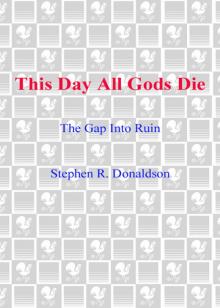 The Gap Into Ruin: This Day All Gods Die
The Gap Into Ruin: This Day All Gods Die White Gold Wielder
White Gold Wielder Fatal Revenant
Fatal Revenant The Mirror of Her Dreams
The Mirror of Her Dreams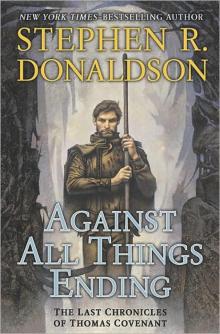 Against All Things Ending
Against All Things Ending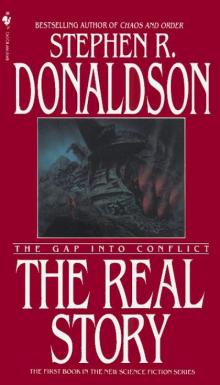 The Real Story: The Gap Into Conflict
The Real Story: The Gap Into Conflict The Power That Preserves
The Power That Preserves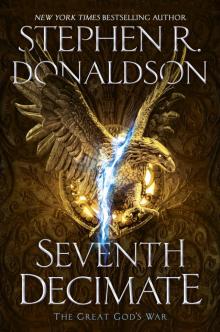 Seventh Decimate
Seventh Decimate The Gap Into Power: A Dark and Hungry God Arises
The Gap Into Power: A Dark and Hungry God Arises A Man Rides Through
A Man Rides Through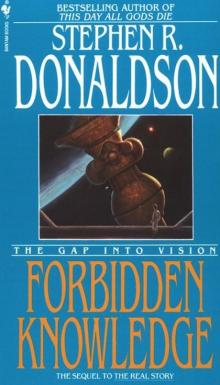 The Gap Into Vision: Forbidden Knowledge
The Gap Into Vision: Forbidden Knowledge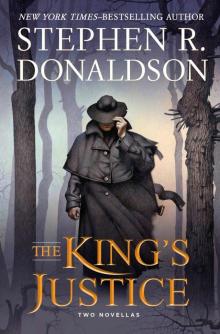 The King's Justice: Two Novellas
The King's Justice: Two Novellas The Wounded Land
The Wounded Land The Runes of the Earth
The Runes of the Earth Mordant's Need
Mordant's Need The One Tree
The One Tree Gilden-Fire
Gilden-Fire Reave the Just and Other Tales
Reave the Just and Other Tales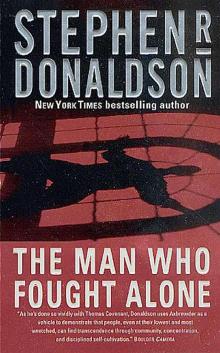 The Man Who Fought Alone
The Man Who Fought Alone The Last Dark
The Last Dark The Man Who Tried to Get Away
The Man Who Tried to Get Away Thomas Covenant 02: The Illearth War
Thomas Covenant 02: The Illearth War A Dark and Hungry God Arises
A Dark and Hungry God Arises The One Tree t2cotc-2
The One Tree t2cotc-2 Lord Foul's Bane cotc-1
Lord Foul's Bane cotc-1 The Illearth War t1cotc-2
The Illearth War t1cotc-2 The Runes of the Earth: The Last Chronicles of Thomas Covenant - Book One
The Runes of the Earth: The Last Chronicles of Thomas Covenant - Book One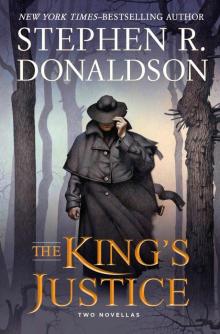 The King's Justice
The King's Justice White Gold Wielder t2cotc-3
White Gold Wielder t2cotc-3 The Power That Preserves t1cotc-3
The Power That Preserves t1cotc-3 Thomas Covenant 01: Lord Foul's Bane
Thomas Covenant 01: Lord Foul's Bane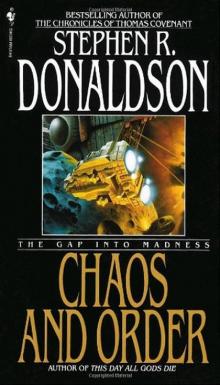 Chaos and Order: The Gap Into Madness
Chaos and Order: The Gap Into Madness Daughter of Regals
Daughter of Regals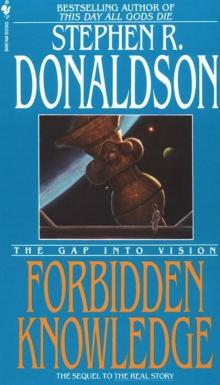 Forbidden Knowledge: The Gap Into Vision
Forbidden Knowledge: The Gap Into Vision Fatal Revenant t3cotc-2
Fatal Revenant t3cotc-2 The Runes of the Earth t3cotc-1
The Runes of the Earth t3cotc-1 Thomas Covenant 03: Power That Preserves
Thomas Covenant 03: Power That Preserves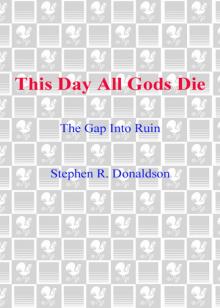 This Day all Gods Die: The Gap into Ruin
This Day all Gods Die: The Gap into Ruin The Wounded Land t2cotc-1
The Wounded Land t2cotc-1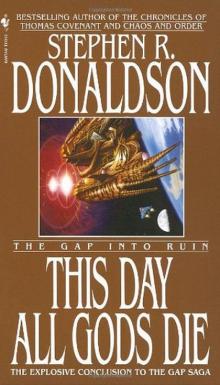 This Day All Gods Die
This Day All Gods Die One Tree
One Tree